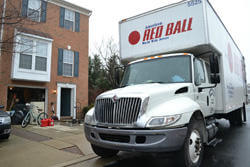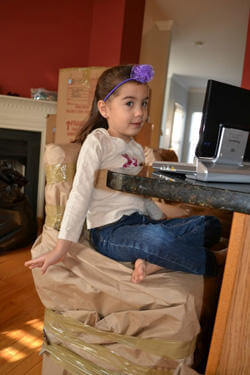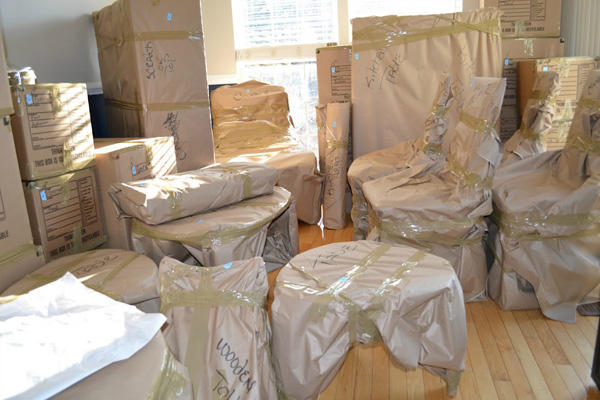Assuming the average PCS requires an average of 2.5 months of planning, packing, unpacking, and readjusting, I have worked more than 24 months of my adult life coordinating our family's moves over the course of my husband's career. A sobering thought, considering some have attained advanced degrees in less time.
Ten military moves have been quite the education. I am thankful for the experience gained and skills learned along the way. Ten opportunities to communicate with transportation and personal property shipping offices, moving companies, packers, property managers, and insurance companies. Ten times the pleasure of visiting DMV, postal address changes, new jobs, and finding new hairdressers and dentists.
A year ago, my husband and I listed pros and cons of locations he would most likely be offered – his potential work satisfaction, job opportunities for me, and educational/social experiences for our daughter at each locale. We further refined the list to identify timelines that meshed with our ability to sell/rent our current home, withdraw daughter from school, and weather conducive to driving our second POV cross country.
Seven months ago, I called the detailer to "negotiate" orders (none of the places on our original list were available).
Six months ago, we received verbal orders (great, but not enough proceed with scheduling the move).
Four months ago, we received written orders (a luxury, some get two months or less), contacted JPPSO, and created our moving calendar, began contacting spouse groups, schools, and prospective employers at new location.
Three months ago, we inventoried HHG and decided what would be moved, stored, sold, or donated.
Two months ago we scheduled our HHG and Unaccompanied Baggage (UB) packout dates, met moving company representative to estimate our weight, cleaned house, organized items by floors/rooms, and met with property manager and prospective renters.
Six weeks ago, we packed and placed everything we would need to hand carry while awaiting new house in DO NOT PACK room, separated items for UB and placed in DO NOT PACK room, packed out HHG, packed out UB, and relocated OCONUS
One month ago, we checked into new duty station, enrolled daughter at her new school, and realized "we weren't in Kansas anymore."
Last week our our car arrived (with a few new squeaks and some minor scratches).
Today, I gratefully write this blog ten days away from being reunited with our HHG in our new home. While we have been living out of suitcases in temporary lodging for more than four weeks, we count our blessings daily and consider ourselves very fortunate.
Ten Lessons I Have Learned
1. No Two Moves are the Same: Every move is different – CONUS/OCONUS, Sea/Shore Command, Personally Procured Move/Movers, TDY Schools, pets, different culture/weather, children, etc. The sooner you embrace the differences and go with the flow, the happier you will be.

2. Make a Plan A, then B, then C, possibly D: Three months out, I printed out a calendar in two-week increments and posted it on a prominent wall with painters tape. I color coded husband's tasks in blue, my tasks in green, and daughter's events in pink. All PCS appointments were capitalized. Most importantly, I blocked out time for farewell social events with family/friends underlined in red.
3. Allot Twice as much Time and Half as Much Energy: In an ideal world, there would be no flu season. Flu season = sick kids. Sick kids can't go to school. More importantly, sick kids = sick parents. Sick parents are sick parents.
4. Stuff – Less is More: Less stuff = less chance of exceeding weight allowance and less to unpack. If it's REALLY important to you, hand-carry it. Also, adequate insurance for collectibles and high value items provides some peace of mind.
5. Hope for the Best, Expect the Worst: Anything in-between will be a pleasant surprise. I remember watching in what seemed like slow motion as a 3.0 cu ft box labeled "Glass – Kitchenware" slipped out of the mover's hands and crashed on the sidewalk below. I worried about that box for three months, only to find a perfectly wrapped set of wine glasses nestled safely inside. This is not to be confused with the sad demise of a rather unceremoniously wrapped porcelain collection jammed under approximately ten pairs of meticulously wrapped boots and work shoes.
6. You Can Only Control Yourself: Everyday in the Navy is a choice to live this life. We may not be able eliminate the minor annoyances of moving every 2-4 years, but we can adjust our attitudes. Kindness begets kindness, smiles are contagious, and always feed your movers.
7. Family Hugs, Reflection, and Gratitude: Remember to squeeze in random acts of love and kindness. Take some time to explain the process to the little ones, ask how they are feeling, and reinforce positives along the way.
8. Perfection is the Enemy of Good Enough: A year ago, I jokingly said this move was going to be "The Perfect PCS". I have come to realize that military moves present great opportunities for enrichment and fun, that is as soon as you remove self-imposed expectations and embrace the unexpected.
9. Friends are the Family You Choose: Saying goodbye to friends never gets easier! But like family, military spouses belong to a sisterhood that understands every nuance of the military move. These friends offer to lend a hand and mean it. They show up with food, offer to babysit your children, and show up at ungodly hours of the night to give you one last hug goodbye. No matter the distance or how much time passes, it's as if we sisters always pick up right where we left off.

10. Take Good Notes and Lots of Photos: While I don't have all the original paperwork from all ten of our moves, I do have notes detailing what went well and what I'd do differently next time around. Smartphones and Etablets have made things much easier on that front! Ironically, one of my favorite possessions is a super low-tech photo journal of one of our PCSs – movers and all! It was our fourth move and I had a new instant sticker camera. Not all moves are created equal though, and photos serve as great documentation in the event something goes awry.
In the end the best advice I can offer is to accept your situation, use existing resources (like move.mil), accept offers of help, hug your friends and family, and try to get some sleep. You, your family, and your stuff will all end up at your new duty station, eventually.
Whether this is your first or eleventh move, a little planning and a positive attitude will go a long way. You will be better off in the end and probably have better photos to show for it. I wish you all the best of luck!
Jennifer Gerrior is a guest blogger of DoDLive and military spouse.














